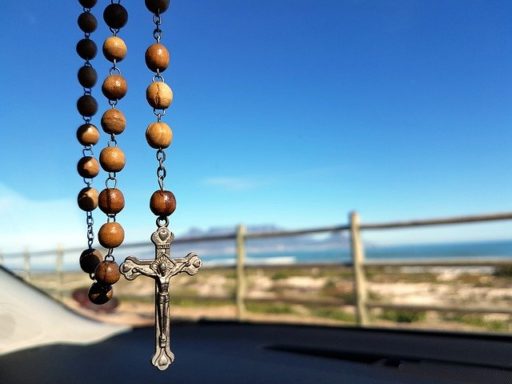Baptism, in Catholic theology, is said to leave an “indelible spiritual mark.” Even if one exits the Church forever, shaking the dust of disillusioned piety from one’s shoes, certain signs of having been “raised Catholic” endure. It’s fascinating, then, to see how that permanent mark bleeds through the page in the work of contemporary American poets both in and out of the Church.
I’m not looking for overtly Catholic poetry conspicuous for its piety, apologetic utility, or even institutional derision. I’m after accomplished poets who can’t stay away from those classic Catholic themes—suffering, death, sex, the pattern of sin and redemption—and habits—self-examination, ritual, memory, the honoring of community over self. Above all, there’s the centrality of the body as contested locus of power and punishment, pleasure and pain.
Three collections published in 2020 clearly fit the mold, each in their own idiom.
The most identifiably Catholic of the three is Angela Alaimo O’Donnell’s Andalusian Hours: Poems from the Porch of Flannery O’Connor (Paraclete Press). It’s an impressive effort, comprising one hundred sonnets written from O’Connor’s point of view and a concluding “poet’s apology” in which O’Donnell begs the deceased author’s pardon for “these brief trespasses on your private mind.” The poems offer snapshots of a life grouped according to the Liturgy of the Hours, the monastic prayer schedule O’Connor observed, breviary in hand, at Andalusia, her family home in Georgia.
O’Donnell inhabits the sonnet form with a relaxed grace and inviting style, noting the “rules” without becoming their slave, accomplishing in each fourteen-line figure what the sonnet does best: thinking with the heart. All but the first and last poems are prefaced with an epigraph, usually excerpted from one of O’Connor’s stories, letters, or lectures. Though the epigraphs themselves are not arranged chronologically, the poems construct a roughly linear narrative arc. Those acquainted with the details of O’Connor’s personality—incisive intelligence, crackling wit, theological depth—or her life—voluminous correspondence, complex relationships with other authors, and her long, losing battle with lupus—will find all that here, but this is more than a biography in verse.
The real enchantment of O’Donnell’s poetry lies in the way she summons O’Connor’s voice, at turns resolute, wistful, mordant, or vulnerable, but never sentimental. Several sonnets concern part of O’Connor’s life some may find difficult to imagine: “Flannery in Love,” reminding us that the creator of so many passionate, embodied characters struggled with her own passions and felt more in her body than the telling of rosary beads or the ravages of lupus.
O’Donnell is more familiar with O’Connor than most, having published several books on the Georgia writer, including a just-released study of O’Connor’s troubling and complex thoughts on race. I, having been raised American, am not surprised about that aspect of her character. No matter how much Americans want their historical figures to be monolithically good or bad, what white person in this country hasn’t held troubling and complex thoughts on race? O’Donnell plumbs Flannery’s heart in all its contradictions, perhaps nowhere more succinctly than when she lets O’Connor assess her own folly:
I’ve long been fond of fools and freaks in part because I am one. I get to spend my days among my kind, watch them fail spectacularly at the business of being human and good. We share a common destiny. Sometimes I laugh until I nearly pee. I don’t know who’s funnier, them or me.
Paul Mariani’s Ordinary Time (Slant) celebrates the Catholic quotidian, those mundane details of the material world, imaginatively invested with meaning. This pattern of immensities hidden within the familiar is everywhere in Mariani’s delightful, unpretentious verse. Though he’s published twenty books, including poetry collections and scholarly biographies of American and English poets, he sounds—on the page and in person—like a beloved uncle telling tall tales from his years as a mechanic at the corner service station. Yet this uncle peppers his stories with offhand references to Dante and Botticelli.
Mariani’s latest volume of poetry, his eighth, distills the many paradoxes of such a life. In describing the artist’s recurring encounter with “a blank slate, the empty canvas, that sheet/of foolscap eight and a half by eleven long,” he summons the voice or image of Robert Creeley, James Franco, Hart Crane, Jackson Pollack, a Zen master, and God, the creator, and ends with an oblique reference to Neitzsche’s imagined encounter with the abyss:
…the empty canvas which seems to taunt the one who dares to stare upon its face until you catch it staring unblinking back into the blank face of the beholder.
Part of Mariani’s charm is in his reluctance to take himself too seriously. He laughs at himself—and his mortified father—in “When My Father Found Out I Wrote Poetry.” In “Mitzvah,” he conducts a very Catholic examination of conscience in a distinctively Jewish setting, as four women show him how to love and care for one’s neighbor, “…someone nameless and confused and, yes,/embarrassed. Someone as lost as your sorry self.” Yet he knows to take seriously what American culture compulsively ignores or sentimentalizes—time, suffering, death—as in the poem, “Mexico.” In recalling his grandfather’s role as a cavalryman in pursuit of Pancho Villa, he imagines the young man floating “as in a dream” through the desert and on to the subsequent “twilight nightmares” in America’s long litany of foreign wars, “one more Polish kid/following orders,” and “doing what he must, until at last the very road/he rides upon with Red his horse will have/long since turned to dust along with him.”
Carolyn Forché’s first new collection in seventeen years, In the Lateness of the World (Penguin), confirms her status as premiere contemporary poet of witness, sharing the testimony of the world’s marginalized and silenced. Forché’s stunning 2019 memoir, What You Have Heard is True, takes its title from the first line of her most anthologized poem, “The Colonel,” an encounter with the banality of evil during the Salvadoran Civil War. It was in El Salvador that she learned the necessity of witness, calling to attention the suffering a complicit America denies.
In an interview with Commonweal last year, Forché describes tiptoeing back into the Catholicism of her girlhood when she discovered the popular church of Central America. This was forty years ago, when the soon to be martyred Oscar Romero embodied the hopes of a people emboldened by liberation theology. “I saw fully a living church,” Forché says in the interview, “and when you come back, and you lose touch with that living church, you feel it, you mourn it. It’s something you grieve the loss of.”
What Forché hasn’t lost is a distinctively Catholic sensibility. She feels the power of ritual, gathering stones “with the hope that this assemblage of rubble, taken together, would become/a shrine or holy place, an ossuary, immovable and sacred.” She ponders the provenance of ancient phrases, reconciling a view of the Aegean with the Homeric “wine dark sea.” But above all, she attends to the suffering of others: a taxi driver recalling his harrowing exodus by sea from war-torn Syria; scenes from a landscape flayed open by war, where “there were children standing on their own/graves and there was the distant sound of cannon;” details of a besieged city where one can read “the braille on its walls,” and “discuss all night the burnt literature/borrowed from a library where all books met with despair.” This is a collection I will return to often.
One needn’t have been raised Catholic to understand or enjoy any of these fine volumes. These three poets ask only for the reader’s heart and head, and a willingness to be marked, perhaps forever, by the words they’ve written.
Brian Volck is a pediatrician and writer living in Baltimore. He is the author of a poetry collection, Flesh Becomes Word, and a memoir, Attending Others: A Doctor’s Education in Bodies and Words. His website is Brianvolck.com





